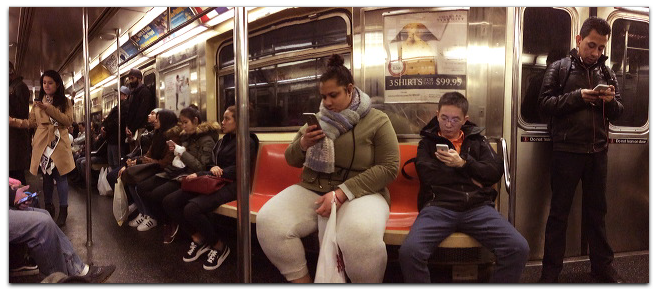
I shot this picture with my phone on the subway last night, while no less absorbed in my personal rectangle than everyone else on the subway (and I do mean everyone) was with theirs.
I don’t know what the other passengers were doing on their rectangles, though it’s not hard to guess. In my case it was spinning through emails, texting, tweeting, checking various other apps (weather, navigation, calendar) and listening to podcasts.
We shape our tools and then they shape us. That’s was and remains Marshall McLuhan‘s main point. The us is both singular and plural. We get shaped, and so do our infrastructures, societies, governments and the rest of what we do in the civilized world. (Here’s an example of all four of those happening at once: People won’t stop staring at their phones, so a Dutch town put traffic lights on the ground. From Quartz.)
Two years from now, most of the phones used by people in this shot will be traded in, discarded or re-purposed. But will we remain just as tethered to Apple, Google, Facebook, Amazon, telcos and the other feudal overlords* that sell us our rectangles and connect to the world? (*A metaphor we owe to Bruce Schneier.)
The deeper question is whether we’ll finish becoming dependent serfs to sovereigns with silos or start becoming self-sovereign as free-range human beings in truly open societies.
The answer will probably be some combination of both. In the meantime, however, one clear need is for greater independence and agency, at least at the individual level. (There are similar needs at the social, political and economic spheres as well, but let’s keep this personal.)
Obsolescence will help.
Within the next two years (just like the last two and the two before that), most phones will do less old-fashioned telephony, text, audio and video, and much more cool (and perhaps scary) new shit (VR, AI, IA, CX and other two-letter acronyms, to name a few off the top of my head and my screen).
Just as surely they’ll also give us new ways to shape what we do and be shaped as well. Perhaps by then mass media will finish turning into the mess media it actually is already, though we don’t call it that yet.
One big Hmm is What comes after phone use spreads beyond ubiquity (when most of us have multiple rectangles)?
Everything gets obsolesced, one way or another, eventually. But that doesn’t mean it goes away. It just means something else comes along that’s better for the main purpose, while the obsolesced tech still hangs around in a subordinated, subsumed or specialized state. Print did that to scribing, Radio did that to print, TV did it to radio, and the Net is doing it to damn near every other medium we can name, subsuming them all and stretching their effects to the absolute limit by eliminating the distances between everything while pushing costs toward zero. (See The Giant Zero for more on that.)
Thus, while all our asses still sit on Earth in physical space, our digital selves float weightlessly in a non-space with no gravity and no distance. Since progress is the process by which the miraculous becomes mundane, we already experience these two states non-ironically and all at once. And een this isn’t new. Here’s what I wrote about it in The Intention Economy, published in 2012:
Story #1. It’s 2002, and the kid is seven. As always, he’s full of questions. As sometimes happens, I don’t have an answer. But this time he comes back with a simple demand:
“Look it up,” he says.
“I can’t. I’m driving.”
“Look it up anyway.”
“I need a computer for that.”
“Why?”
Story #2. It’s 2007, and we are staying overnight in the house of an old family friend. In a guest bedroom is a small portable 1970’s-vintage black-and-white TV. On the front of the TV are a volume control and two tuning dials: one for channels 2-13, the other for 14-83. The kid examines the device for a minute or two and says, “What is this?” I say it’s a TV. He points at the two dials and asks, “Then what are these for?”
Progress is how the miraculous becomes mundane. The beauty of stars would be legend, Emerson said, if they only showed through the clouds but once every thousand years. What would he have made of commercial aviation, a system by which millions of people fly all over the globe, every day, leaping continents and oceans in just a few hours, while complaining of bad food and slow service, and shutting their windows to block light from the clouds below so they can watch a third-rate movie with bad sound on a tiny screen?
The Internet is a sky of stars we’ve made for ourselves (and of ourselves), all just a few clicks away.
Mcuhan says the effects of every new medium can be understood through four questions he calls a tetrad, illustrated this way:

Put a new medium in the middle and then sort effects into the four corners by answering a question for each:
- What does the medium enhance?
- What does the medium make obsolete?
- What does the medium retrieve that had been obsolesced earlier?
- What does the medium reverse or flip into when pushed to extremes?
These are posed as a heuristic: an approach to help us understand what’s going on, rather than a way to come up with perfect or final answers. There can be many answers to each question, all arguable.
So let’s look at smartphones. I suggest they—
- Enhance conversation
- Obsolesce mass media (print, radio, TV, cinema, whatever)
- Retrieve personal agency (the ability to act with effect in the world)
- Reverse into isolation (also into lost privacy through exposure to surveillance and exploitation)
I don’t think we’re all the way into any of those yet, even as every damn one of us in a subway rewires our brains in real time using rectangles that extend our presence, involvement and effects in the world. Ironies abound, invisible, unnoticed. We all smell something. Is it our human frogs boiling? The primordial ooze out of which we are evolving into creatures other than human? What is that?
Here’s a hmm: what will obsolesce smartphones?
I don’t have answers; I’m just sure there will be some—and that we’ll have passed Peak Phone when they come.
Leave a Reply